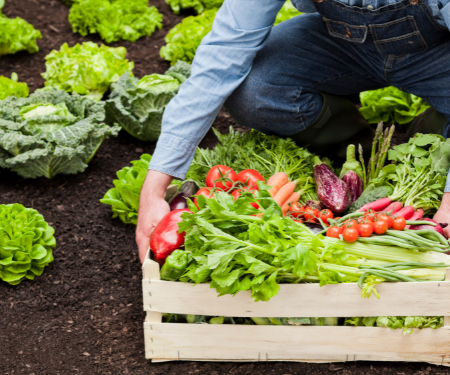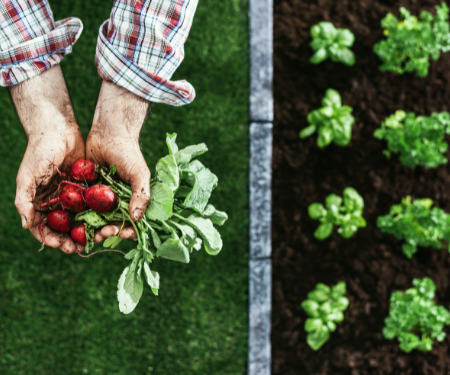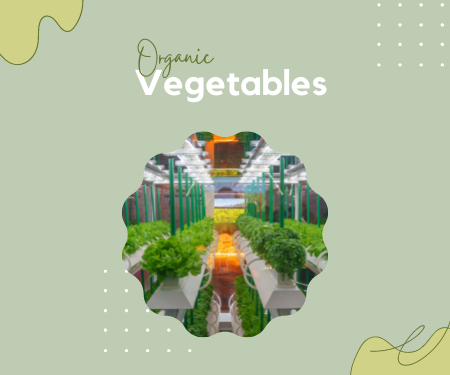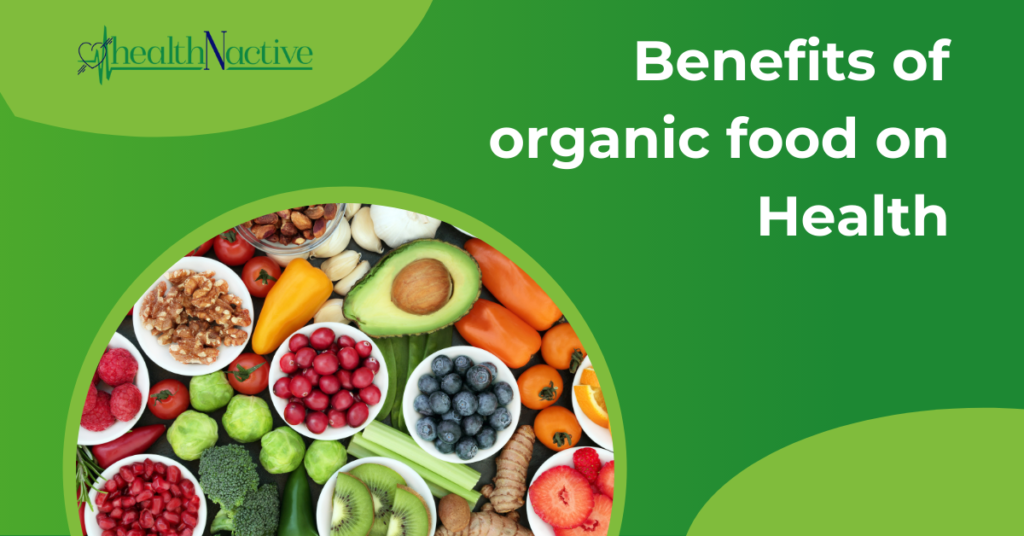Organic food on health is the type of food that is grown and just as important, is processed without using any pesticides, herbicides, antibiotics for livestock, growth hormones or genetically modified organisms (GMO’s). So you need not worry about the safety of consuming food grown with chemicals. In a nutshell, organic food on health is all about eating natural foods without adding any chemicals that might harm your body.
organic food
The term organic is used to refer to methods of farming that do not utilize chemicals and pesticides. Organic foods are grown without the use of synthetic fertilisers, pesticides, or herbicides. Moreover, the animals in organic farms are raised without the use of antibiotics and growth hormones.

Why Is Organic Food Better For Our Health?
Organic food has many benefits for our health; this is why it is becoming more popular among consumers as they become more aware of its health benefits. Some studies show that organic food contains fewer pesticides than conventional food; however, there are many other benefits of consuming organic food:
1- Fewer pesticides and antibiotics.
Organic foods contain fewer toxins and hormones because they are produced without the use of synthetic fertilisers or pesticides. In addition, animals in organic farms are not fed with antibiotics or growth hormones. By consuming fewer toxins and hormones, we reduce our chances of developing certain types of cancer such as breast cancer and prostate cancer. Moreover, by consuming fewer antibiotics, we reduce our chances of developing antibiotic resistance and any other side effects associated with these drugs.
2- More nutrients and antioxidants.
A number of studies have shown that the levels of vitamins A, C and E in fruits and vegetables from organic farms are higher. Antioxidants are the compounds that help neutralize free radicals which can cause cell damage leading to various diseases like heart disease, diabetes, cancer, arthritis, etc. A study published in the British Journal of Nutrition found that organic crops have a much higher level of antioxidants as compared to non-organic crops. According to the study, fruits and vegetables grown organically contain 18% more antioxidants.
Environmental Benefits of Organic foods
Organic foods are less destructive to the environment than conventional choices. Organic agriculture reduces pollution, conserves water, reduces soil erosion, enhances soil fertility, and uses less energy. Pesticide-free agriculture is also better for nearby birds and animals, as well as people who live near fields.
Organic farms are also better for adjacent animals and birds, as well as for people who live near the farms. Organic products must meet government criteria in various nations, including the United States. The goal of these standards is to integrate cultural, biological, and mechanical practices that foster the cycling of resources, promote ecological balance, and conserve biodiversity. Synthetic fertilisers and pesticides are generally prohibited, although certain organically approved pesticides may be used under limited conditions.

Nutritional Benefits of Organic Fruits and Vegetables
Organic foods have higher levels of antioxidants. Antioxidants help to protect our cells against the impact of free radicals, which can cause damage to our cells. Antioxidants are associated with a reduced risk of some chronic diseases, including cardiovascular disease and certain cancers.
Organic foods generally have a higher content of vitamin C, magnesium and phosphorus and lower levels of nitrates than their non-organic counterparts. However, there is not enough evidence to say that the differences seen are enough to be of any nutritional significance.

Organic meat has a lower concentration of some nutrients than non-organic meat because organic standards prohibit the use of the growth hormone rBGH, which increases milk production in cattle. The use of antibiotics is also limited under organic standards.
Organic food differs from non-organic food in some ways:
Organic food may have more antioxidants because, The plants are exposed to less nitrogen, which means they produce fewer nitrites (a preservative) when eaten raw. The plants may produce and accumulate more antioxidants as protection against pests, disease and stress from weeds.
Organic food may have fewer pesticides when grown conventionally: Pesticides kill pests that eat crops but also kill insects that are beneficial for pollination.
The Organic Farming Movement
The organic farming movement emerged in the 1940s in response to the industrialisation of agriculture known as the Green Revolution. The Green Revolution led to a massive increase in food production but also had many negative consequences for both humans and the environment.

The first step toward an ecologically sustainable agricultural system began with Sir Albert Howard’s book “An Agricultural Testament” published in 1940. Howard was an English agronomist and botanist who worked in India for 21 years, where he learned about traditional Indian farming systems. He was one of the first to recognise that soil quality was at the heart of agricultural sustainability and that there were many parallels between natural ecosystems and agricultural systems. In his book, he emphasised the importance of healthy soil and composting methods. His work helped lay the foundations of what we now call organic farming and gardening.
15 best organic foods
There’s a lot of confusion regarding organic foods, especially produce. The USDA has published guidelines that say food labelled organic must be grown without the use of synthetic pesticides, bioengineered genes (GMOs), petroleum-based fertilisers, and sewage sludge-based fertilisers.
The meat, poultry, eggs, and dairy products where an animal was fed organic feed and was not treated with antibiotics or growth hormones can also be labelled organic.
Organic food is frequently more expensive than regular food. However, if you’re concerned about GMOs, pesticides, and other toxins in your food, you should consider going organic.
The top 15 most popular organic foods are as follows:
Tomatoes
Cucumbers
Potatoes
Peppers
Onions
Milk
Salad greens
Berries: strawberries, blueberries, raspberries & blackberries
Grapes
Beef/Steak
Carrots
Eggs

